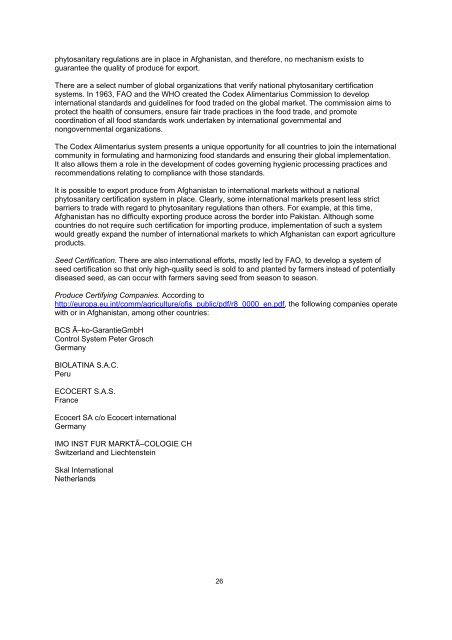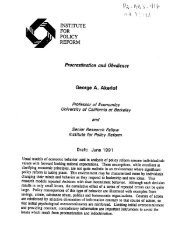Afghanistan Accelerating Sustainable Agriculture ... - part - usaid
Afghanistan Accelerating Sustainable Agriculture ... - part - usaid
Afghanistan Accelerating Sustainable Agriculture ... - part - usaid
You also want an ePaper? Increase the reach of your titles
YUMPU automatically turns print PDFs into web optimized ePapers that Google loves.
phytosanitary regulations are in place in <strong>Afghanistan</strong>, and therefore, no mechanism exists to<br />
guarantee the quality of produce for export.<br />
There are a select number of global organizations that verify national phytosanitary certification<br />
systems. In 1963, FAO and the WHO created the Codex Alimentarius Commission to develop<br />
international standards and guidelines for food traded on the global market. The commission aims to<br />
protect the health of consumers, ensure fair trade practices in the food trade, and promote<br />
coordination of all food standards work undertaken by international governmental and<br />
nongovernmental organizations.<br />
The Codex Alimentarius system presents a unique opportunity for all countries to join the international<br />
community in formulating and harmonizing food standards and ensuring their global implementation.<br />
It also allows them a role in the development of codes governing hygienic processing practices and<br />
recommendations relating to compliance with those standards.<br />
It is possible to export produce from <strong>Afghanistan</strong> to international markets without a national<br />
phytosanitary certification system in place. Clearly, some international markets present less strict<br />
barriers to trade with regard to phytosanitary regulations than others. For example, at this time,<br />
<strong>Afghanistan</strong> has no difficulty exporting produce across the border into Pakistan. Although some<br />
countries do not require such certification for importing produce, implementation of such a system<br />
would greatly expand the number of international markets to which <strong>Afghanistan</strong> can export agriculture<br />
products.<br />
Seed Certification. There are also international efforts, mostly led by FAO, to develop a system of<br />
seed certification so that only high-quality seed is sold to and planted by farmers instead of potentially<br />
diseased seed, as can occur with farmers saving seed from season to season.<br />
Produce Certifying Companies. According to<br />
http://europa.eu.int/comm/agriculture/ofis_public/pdf/r8_0000_en.pdf, the following companies operate<br />
with or in <strong>Afghanistan</strong>, among other countries:<br />
BCS Öko-GarantieGmbH<br />
Control System Peter Grosch<br />
Germany<br />
BIOLATINA S.A.C.<br />
Peru<br />
ECOCERT S.A.S.<br />
France<br />
Ecocert SA c/o Ecocert international<br />
Germany<br />
IMO INST FUR MARKTÖCOLOGIE CH<br />
Switzerland and Liechtenstein<br />
Skal International<br />
Netherlands<br />
26

















